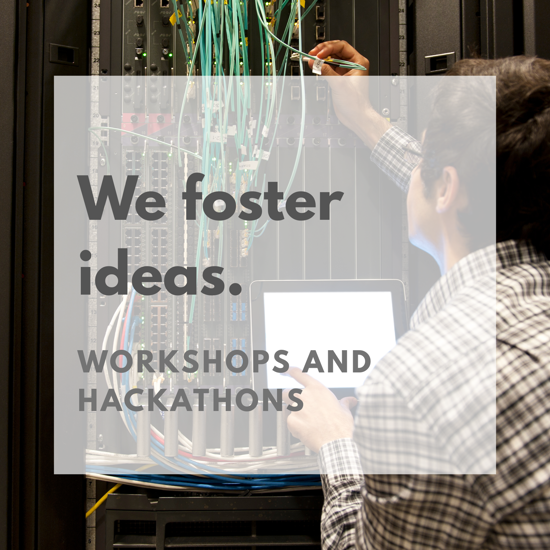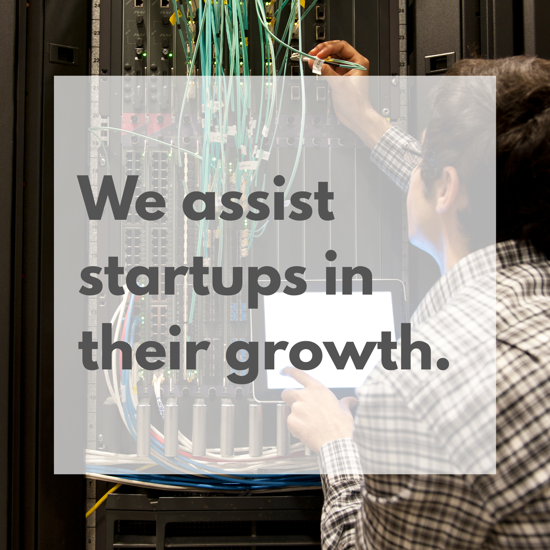

In Focus: IT&C
The North-West region hosts a dynamic IT ecosystem, with its epicenter in Cluj-Napoca, the country's second-largest tech hub. The sector is primarily focused on software services, outsourcing, and digitalization solutions, but also includes hardware infrastructure and telecommunications. Over the past two decades, the regional IT industry has experienced explosive growth, significantly contributing to the local economy. Numerous global companies and innovative startups operate here, making the North-West a hub for tech investments and talent.
Cloud development and data centers – the digitalization of the global economy and the need for robust digital solutions make investments in cloud infrastructure and data centers highly attractive.
Artificial Intelligence and Machine Learning – a major global trend transforming industries; the North-West region boasts a young, well-trained workforce (universities in Cluj and Oradea).
Cybersecurity – growing demand for data protection and network security; investments in IT security solutions are supported by European priorities for defending critical digital infrastructures.
Internet of Things (IoT) and smart city solutions – integrating sensors and cyber-physical systems into industries and smart cities is a priority innovation area (according to the regional RIS3 strategy), with local industries and administrations focused on efficiency.
IT services and outsourcing – local software and outsourcing companies serve European clients, benefiting from a skilled workforce and lower costs.
FinTech and blockchain – Romania and the EU encourage regulated digital financial applications and cryptocurrencies.
E-commerce and mobile apps – the rapid growth of online commerce and widespread smartphone usage, combined with lower operational costs, make investments in online platforms and retail apps highly attractive.
EduTech and digital education solutions – internet penetration and the pandemic have boosted online learning platforms.
Gaming, virtual reality, and augmented reality – an expanding global creative industry; the presence of game and animation studios in Cluj creates a suitable ecosystem for AR/VR development.
Big Data and advanced data analytics – companies of all sizes seek predictive analytics and business intelligence services; local talent facilitates investments in firmware and big data software solutions.
Next-generation communication networks (5G, IoT) – investments in fast networks (5G) and industrial IoT are supported by national strategies and can attract funding for digital infrastructure.

Innovation and entrepreneurship
The innovation ecosystem in the North-West is strengthened by collaboration between academia, local authorities, and the private sector. There are two major IT clusters: Cluj IT Cluster and Transilvania IT Cluster, bringing together hundreds of companies, universities, and public institutions. These clusters organize annual events like Cluj Innovation Days, which promote tech trends (e.g., digital transformation or cybersecurity) and facilitate partnerships. Additionally, the Techsylvania conference in Cluj attracts investors and entrepreneurs from around the world. Initiatives such as accelerators (Spherik, Risky Business) and digital innovation hubs (e.g., DIH4Society: regional digital transformation hub) provide mentorship and access to funding for new tech ventures.

Companies
The North-West is home to a diverse range of IT companies. A significant portion consists of subsidiaries of major multinationals and outsourcing providers, serving global clients in software development, IT support, and R\&D. Top players include Endava, NTT Data, Bosch (automotive software engineering), Continental, Emerson (hardware), and local centers of Microsoft, HP, and IBM. Alongside them, Romanian companies based in Cluj have also made their mark, such as AROBS (software and services, listed on the BVB), Fortech (software engineering, acquired by GlobalLogic), and Yonder/Tremend. The city also hosts a vibrant tech startup scene focused on proprietary products (e.g., dotLumen – assistive devices, Telios – telemedicine), many of which have grown with local support and gained the attention of international investment funds. In telecommunications, companies like Orange and Vodafone have invested in modern networks, with Cluj-Napoca being among the first cities in the country to offer commercial 5G services.

Workforce
Human capital is the main asset of the IT sector in the region. Most IT specialists are concentrated in Cluj-Napoca, which has the highest number of IT employees outside of Bucharest, accounting for about 15% of the national total. The local workforce profile includes programmers, testers, data analysts, system administrators, and telecom specialists, many of whom are fluent in foreign languages. However, in recent years, there has been a slight slowdown in employment growth. After the number of IT professionals in Romania exceeded 200,000 in 2022, 2023 saw a contraction to around 190,000, due to global tech turbulence and fiscal changes. Even so, local companies focus on continuous improvement, with niche specializations (AI, cybersecurity, FinTech) becoming increasingly in demand.

Average Wage
IT offers some of the most competitive salaries in the region. In Cluj County, the average net salary reached approximately 6,600 RON by the end of 2024, above the national average, with the IT sector significantly contributing to this level. Nationally, the average salary in IT was 9,701 RON (about 1,970€) according to the National Institute of Statistics. In Cluj-Napoca, an entry-level programmer (junior) often earns between 4,000–6,000 RON net, while mid-level positions reach around 11,000 RON, and a senior software developer can earn over 15,000 RON net per month. Additionally, many companies offer extra-salary benefits: performance bonuses, private health insurance, stock options, or training budgets. Notably, until recently, IT professionals benefited from a 10% income tax exemption, which boosted their net income; however, this tax benefit is in the process of being phased out.

Education
The region's robust educational network consistently feeds the IT industry with specialists. Cluj-Napoca is a strong university center, with over 15,000 students annually in ICT fields. Babeș-Bolyai University (UBB) and the Technical University of Cluj-Napoca (UTCN) prepare most of the future programmers, offering specializations in computer science, automation, computer engineering, electronics, and telecommunications. Programs like Innovation Labs or entrepreneurship courses integrated into the university curriculum encourage students to develop their own projects. In Oradea, Baia Mare, and Satu Mare, there are also universities and technical colleges training IT staff (e.g., the Faculty of Managerial and Technological Engineering at the University of Oradea). In addition to the university system, numerous bootcamps and private academies (e.g., the Informal School of IT) offer requalification in programming for young professionals. At the pre-university level, the IT high schools in Cluj (such as the "T. Popoviciu" Informatics High School) and other counties have notable performances, with many graduates pursuing IT careers. This diverse educational infrastructure ensures a solid talent pool for regional companies and creates a favorable environment for innovation.

R&D
R\&D activity in IT is growing in the North-West, supported by both the academic environment and corporate centers. Universities in Cluj are conducting research projects in artificial intelligence, robotics, cybersecurity, and IoT, often in international consortia. The UTCN Technological Research Institute and specialized institutes at UBB (such as those in Mathematics and Computer Science) collaborate with tech companies for knowledge transfer. Major multinational companies have established local R\&D hubs: for example, Bosch and Porsche Engineering are developing algorithms for autonomous vehicles in Cluj, while Siemens has teams in Brașov and Cluj working on embedded systems. Through various coordinated efforts, such as clusters, digital innovation hubs, incubators, and accelerators, all closely connected to the business and academic environments, the North-West is strengthening its position not only as an IT service provider but also as a generator of innovation and intellectual property.

Challenges
• Employee shortage: demand for specialists exceeds supply, putting pressure on recruitment and salaries. • Rising costs: as the industry grows, the cost of living in cities like Cluj-Napoca has increased (e.g., office and housing rents), impacting company profits and employee relocation packages. • Dependence on outsourcing: a large part of the ecosystem is focused on outsourcing and services for external clients. While this provides stability, it leads to fewer in-house products. • Global volatility: disruptions in the global IT industry have been felt locally. In 2023, several companies froze hiring or made layoffs as a precaution. Fluctuations in global demand and investments may affect regional companies' expansion plans. • Changing legislative environment: government plans to eliminate fiscal benefits and frequent changes to the Fiscal Code create uncertainty among IT investors.
 Tax exemption for programmers
Tax exemption for programmers
 Digitalization of public administration - Law no. 242/2022, Emergency Ordinance 89/2022, 5G Law
Digitalization of public administration - Law no. 242/2022, Emergency Ordinance 89/2022, 5G Law
 Incentives and Regulations for Innovation
Incentives and Regulations for Innovation
Since 2004, programmers' income has been exempt from income tax (10%), a benefit regulated by Article 60, Section 2 of the Fiscal Code (Law 227/2015) and common implementation orders. The conditions include a university degree, an employer with income from software development, and an IT role as defined by the COR list. Since 2023, a cap has been introduced: the exemption applies only to the portion of the gross income up to 10,000 lei per month. The government has announced plans to fully eliminate this benefit by July 2025, as part of measures to reduce the budget deficit, a change that raises concerns within the industry (ANIS warns about the negative impact).
The new legislative framework is driving the transition to e-government and the interoperability of public IT systems. Law no. 242/2022, concerning data exchange between information systems, provides for the creation of the National Interoperability Platform, requiring institutions to interconnect their databases. Additionally, Emergency Ordinance 89/2022 laid the foundation for the development of the Government Cloud, which involves regional data centers (including in Transylvania) and the gradual migration of public services to secure digital platforms. The 5G Law (Law no. 163/2021) establishes the conditions for authorizing 5G telecom equipment from a national security perspective—relevant for regional operators, given the investments in 5G infrastructure.
The state supports tech research and innovation through schemes such as the tax credit for R\&D activities (additional 50% deduction for research expenses, according to the Fiscal Code) and funding programs (e.g., PNRR rules for SME digitalization). Additionally, IT startups can benefit from the business angels law (Law 120/2015) and the recently regulated crowdfunding framework (Law 244/2022), which facilitates access to capital. At the regional level, local authorities (e.g., Cluj City Hall) have adopted smart city strategies and innovation support regulations (such as local tax exemptions for spaces designated for IT hubs), in line with the National Strategy for the Digital Agenda.


